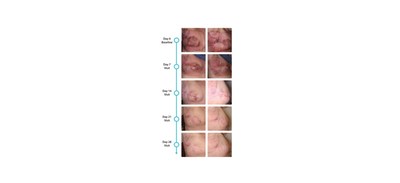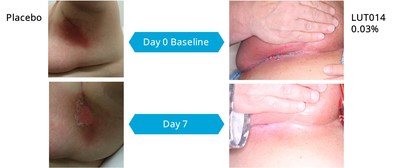75% of Patients in Part 1 Experienced Complete Resolution of Radiation Dermatitis
Part 2 Data Shows Clinically Relevant Treatment Effect in 100% of Patients on LUT014 vs. 72.7% on Placebo
Secondary Endpoints Support Potential Activity of LUT014 on Quality of Life and Treatment Efficacy in the Management of Radiation Dermatitis
TEL AVIV, Israel, Sept. 7, 2022 /PRNewswire/ -- Lutris Pharma, a clinical stage biopharmaceutical company focused on improving anti-cancer therapies by reducing dose limiting side effects, today announced positive top-line results from the open label part 1 and double blinded part 2 of its phase 1/2 trial of lead compound, LUT014, a topically applied, novel B-Raf inhibitor, for the treatment of radiation-induced dermatitis (RD) in patients with breast cancer.

Part 1 results showed that, of the eight patients who developed grade 2 RD at baseline, 75% (7/8) had complete resolution, improving to grade 0 dermatitis, and 100% of patients had RD of 1 or 0 as assessed by the Common Terminology Criteria for Adverse Events (CTAE) after 28 days of daily, topically applied LUT014 gel. All of the patients derived benefit in quality of life by day 28 as assessed by the validated, self-reporting Dermatology Life Quality Index (DLQI) questionnaire, with seven of eight patients experiencing no or small effect of the dermatitis on their respective quality of life after the treatment course. The primary endpoint of the open-label part 1 was the incidence of Treatment-Emergent Adverse Events as assessed by CTAE at 12 weeks and the data showed that LUT014 was generally well tolerated, no severe or serious adverse events occurred and no adverse events were associated with discontinuation of the study drug.
The primary endpoint of the double blinded part 2 of the phase 1/2 trial was the change in severity of radiation dermatitis, based on a validated self-reporting DLQI questionnaire at 14 days, as measured by improvement of at least 5 points on the DLQI at day 14. Of note, 8/8 (100%) of patients treated with LUT014 versus 8/11 (73%) of patients treated with placebo achieved the primary endpoint (27% absolute difference, Fisher's Exact test, p=0.23). Secondary endpoints examined further quality of life variables as well as treatment effect. Improvement in the DLQI score at day 7 was noted by an increase of 30% in the treated arm versus placebo arm; the proportion of patients who showed improvement from grade 2 to grade 1 by day 7 was 75% (6/8) for patients who received LUT014 versus 54% (6/11) for patients who received placebo; and the proportion of patients who achieved complete recovery (grade 0) by day 28 was 50% (4/8) for LUT014 versus 36% (4/11) for placebo.
"We are extremely encouraged by the strong part 1 results and the equally impressive part 2 data, which show 100% of patients with radiation dermatitis in the LUT014 treatment arm experiencing a clinically meaningful treatment effect," stated Noa Shelach, Ph.D., Chief Executive Officer of Lutris Pharma. "The secondary endpoints reported were all supportive, as well, and further highlight the potential, unique ability of LUT014 to expedite patient recovery within just one to two weeks and to make a marked difference in quality of life. Given the fact that the majority of patients with breast cancer will develop radiation dermatitis, these results further empower our thesis about the promise of LUT014 to treat this patient population."
Benjamin W. Corn, M.D., Chief Medical Officer of Lutris Pharma, added, "Part 2 of the phase 1/2 study provided us with impactful information that supports the need for further study of LUT014 in this radiation-induced dermatitis indication. Based on the top-line results, the 100% success rate indicates that the active arm response is saturated and that there might be an even a greater effect that cannot be detected in the current study design. That said, we believe we may be able to see a higher effect between treatment and placebo arms if LUT014 is started earlier, right after a patient's radiation treatment."
Antoni Ribas, M.D., Chairman of the Board of Directors of Lutris Pharma, noted, "These favorable results in patients with radiation dermatitis, coupled with the highly encouraging data generated, thus far, in the company's study of LUT014 in patients with mCRC with EGFR inhibitor induced acneiform lesions, tells us that the LUT014 compound is active to treat skin conditions that could benefit from the topical administration of this small molecule BRAF inhibitor, which opens the door to its use in numerous additional indications, and we look forward to exploring these options and expanding the pipeline in the future."
For more information about this clinical trial, please visit: www.clinicaltrials.gov, NCT04261387.
About LUT014
LUT014 is a novel B-Raf inhibitor which is applied topically on the skin. When the B-Raf protein is mutated, as is the case in some human cancers such as melanoma cancer, blocking this pathway leads to apoptosis of the cells and tumor shrinkage. However, when the same pathway is blocked in normal, non-mutated cells, the opposite happens: the MAPK pathway is activated, and cells start growing. This phenomenon is recognized as the paradoxical effect of B-Raf Inhibitors. LUT014 harnesses the paradoxical effect of B-Raf Inhibitors in order to enhance cell proliferation and balance cell destruction, typical to radiation dermatitis.
About Radiation Dermatitis
Radiation therapy results in ionization events that lead to damage of cellular macromolecules, including double-stranded DNA breaks. Within the epidermis, this DNA damage disrupts the normal proliferation and differentiation of basal keratinocytes, depleting the differentiated epidermal keratinocytes and ultimately resulting in the loss of the protective barrier provided by the skin. This, combined with DNA damage disruption within the dermis, which results in a complex sequence of effects including an immune response cascade, leads to the symptomology associated with radiation dermatitis, which can dramatically diminish a patient's quality of life.
There is currently no FDA-approved drug whose labelled indication is for the prevention or treatment of radiation-induced dermatitis. Rather, patients are merely treated with supportive cutaneous care. These treatments - which have a weak evidence base -- have included topical steroids, non-steroidal anti-inflammatory topicals, and hyaluronic acid derivatives. To date, none has been definitively proved efficacious.
About Lutris Pharma
Lutris Pharma is a clinical stage biopharmaceutical company focused on improving anti-cancer therapy effectiveness and quality of life for patients who are being treated with EGFR (Epidermal Growth Factor Receptor) inhibitors or with radiation, where dermal toxicity often leads to a reduction of anti-cancer therapy compliance. The company aims to provide novel topical therapies in order to mitigate these side effects and enable patients' adherence to anti-cancer treatment.
Lutris Pharma is currently assessing the effectiveness of LUT014 in two clinical studies: a randomized, double-blind, placebo-controlled efficacy and safety study of topically administered LUT014 in metastatic colorectal cancer patients with EGFR inhibitor induced acneiform lesions (NCT04759664), and a phase 1/2 open-label followed by blinded study evaluating the safety, tolerability and efficacy of topically administered LUT014 (LUT-RD) in breast cancer patients with radiation induced dermatitis (RD) (NCT04261387).
For more information, please visit www.lutris-pharma.com.
Contacts:
Lutris Pharma
Noa Shelach, Ph.D.
Chief Executive Officer
ir@lutris-pharma.com
Rx Communications Group
Michael Miller
+1-917-633-6086
mmiller@rxir.com


Photo - https://mma.prnewswire.com/media/1893534/RD_part_1.jpg
Photo - https://mma.prnewswire.com/media/1893535/RD_part_2.jpg
Logo - https://mma.prnewswire.com/media/1586358/Lutris_Logo.jpg

